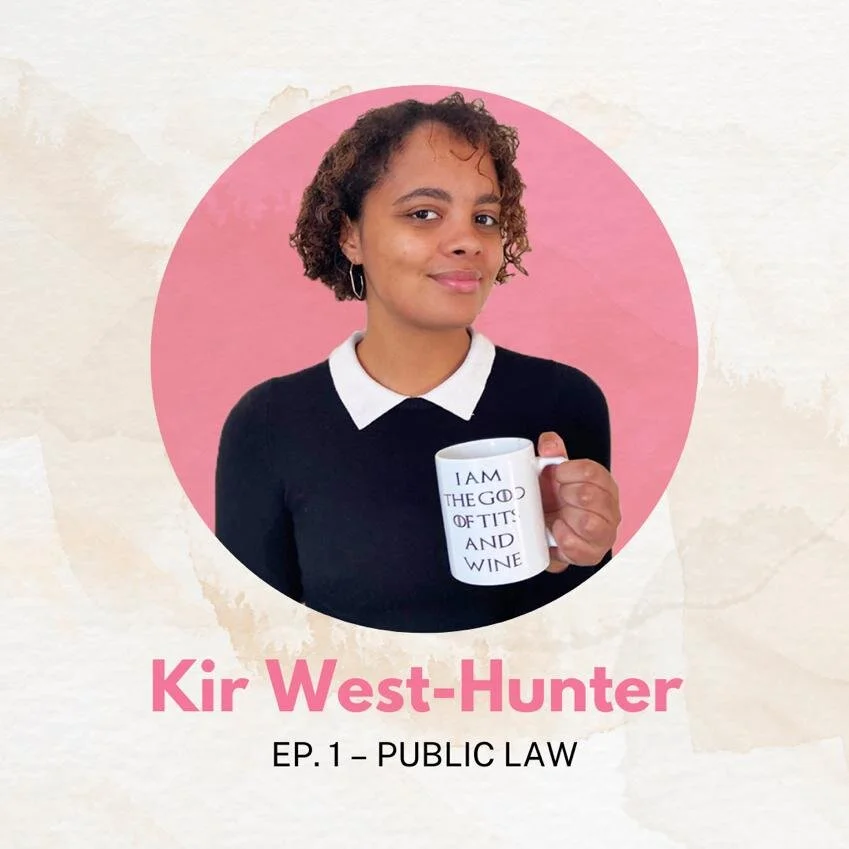Public Law with Kir West-Hunter
Joining us this week on Legal Tea is Kir West-Hunter, a paralegal at Simpson Millar. As somebody who just ‘loves justice’, Kir was already passionate about constitutional law when she enrolled at St. Anne’s College, Oxford. But how did Kir turn this passion into a career and what are the opportunities and challenges that working in the public law sector present for a new graduate?
“It can be really hard at university to go your own way and find your own path.”
Studying a law degree inevitably means that you’re constantly bombarded with information about corporate law, to the extent that it can sometimes feel like the only route available to you in your career. But while working in this sector is a completely fair and valid choice, and one in which many people thrive, it’s important to remember that this isn’t your only option. You may have a clear vision of the work you want to do from day 1, or you might find your own niche interests over the course of study, or you might just know that corporate law isn’t for you. If this is the case, don’t let the lack of clearly defined pathways or a fear of ‘being left behind’ hold you back from carving your own career path.
If, like Kir, your heart belongs to public law, you should consider undertaking a few mini-pupillages. These internships at barristers’ chambers will expose you to a huge variety of practice areas, which will help you figure out which niches you do and (just as importantly) which you definitely do not want to work in in the future. You should also be proactive about seeking out and actually talking to some barristers and judges. Even if you don’t want to be a barrister yourself, these people tend to be more open to different areas and your conversations will help give you a real flavour for the law. And, as public law firms and solicitors don’t tend to offer the vacation schemes you’ll find on the corporate side of things, these connections can come in very handy when it comes to securing work experience.
If it’s not something you’ve really thought about before, why might a career in public law be something you want to consider? First and foremost, the stakes can feel a lot higher in public law; perhaps not in financial terms but certainly in the impact your work can have on the lives of ordinary people. You might be helping unaccompanied minors, or working to reunify a family, or resolving accommodation issues for children in care; either way, you are championing vulnerable people and challenging the structural imbalance of power between people and the state. And while these cases may feel small at an individual level, they are actually a lot bigger than they seem and pose questions which are fundamental to our society; is there a reciprocal relationship between the citizen and the state?
“What happens to a local authority when parliament is happy to legislate all of these statutory obligations but they are not happy to provide the funding… Should the burden of that be placed on these vulnerable individuals?”
Of course, there are challenges involved in pursuing this career path; in many ways it’s a harder and less secure life to work in public rather than corporate law. Social mobility in this area isn’t great and there are high barriers to entry, although improvements are being made every year. But as Kir shows, it can be an incredibly rewarding sector and if you’re really keen to explore public law as a career option, Kir has three fantastic tips:
1. Be honest with yourself. What is it you want out of a career in law? If the answer is financial security early on, that’s absolutely fine, but in this case perhaps corporate is a better path. If you think working in an area you’re genuinely passionate about is more important, ask yourself some hard questions and be prepared to make some compromises. Are you happy to be a bit less secure if it means you can work in areas you find really interesting?
2. Remember, there’s no rush! It can be hard to remember in an industry which attracts very ambitious, intelligent people and which is often glamorized in the media, but you don’t have to do everything right away. Take some time, dabble in different areas and gain a broad base of experience. Aspiring barristers often just want to get down to the business of saving people’s lives right away but go easy on yourself. You have time to cultivate interests; don’t be too quick to dismiss things.
3. Network. It can be hard, it can feel awkward at times, but there’s honestly no better way to find things out and make contacts who might be helpful in future. Start off by following big public law commentators, barristers, chambers, and charities on Twitter. They will often post about zoom sessions which can be fantastic opportunities to meet people for advice or just feel reassured that there are people out there who have pursued a passion, jumped hurdles and made their career in public law.

